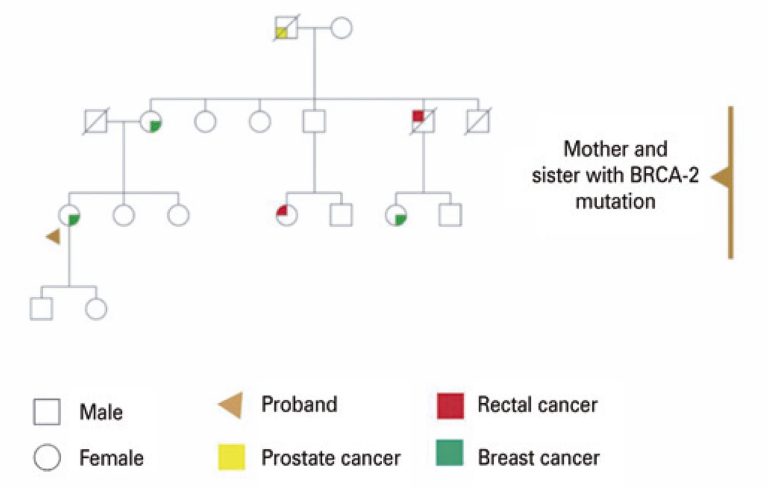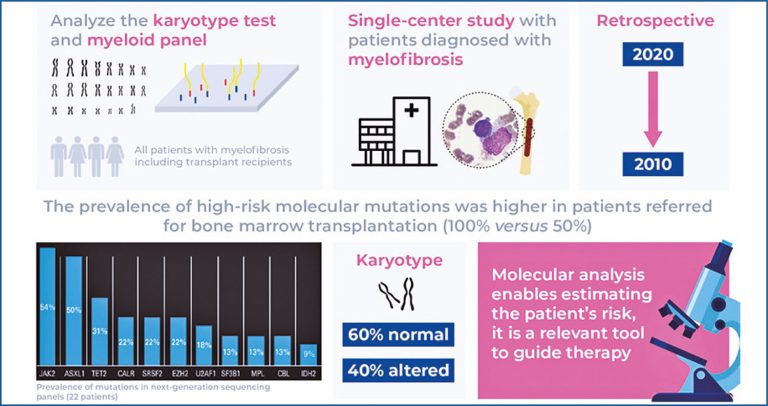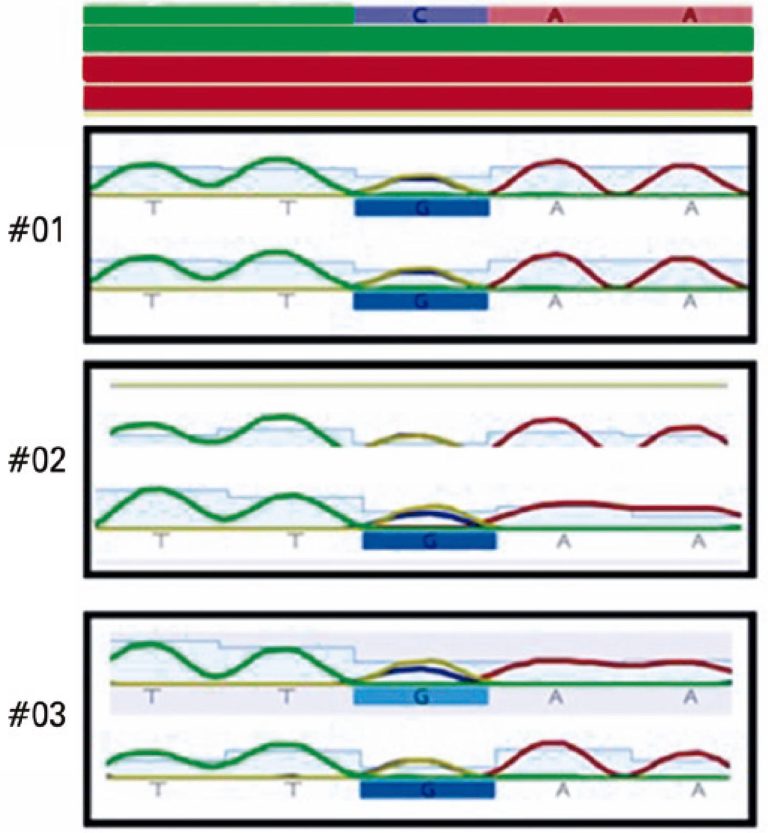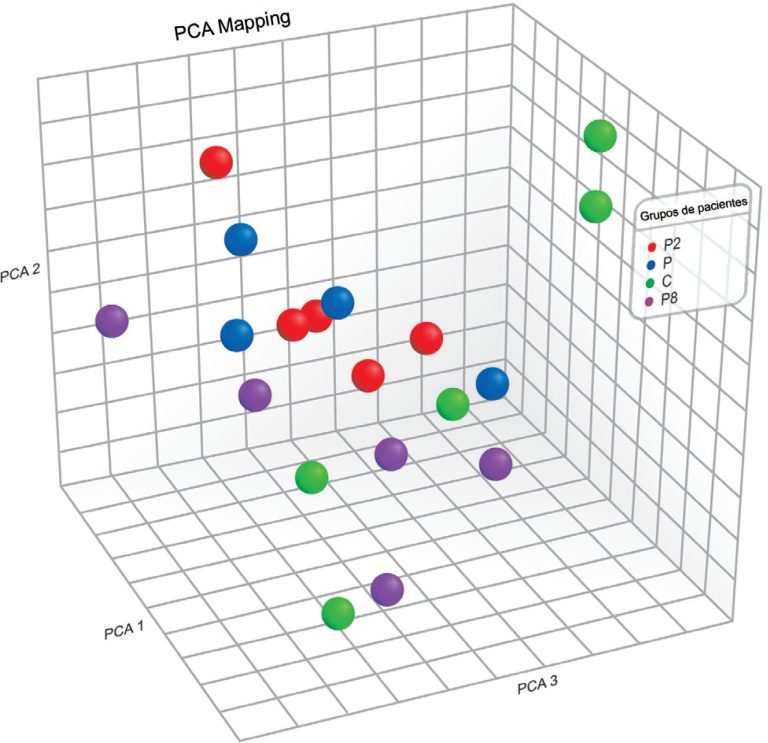10/nov/2023
Phenocopy in a patient with triple negative breast cancer: a case report
DOI: 10.31744/einstein_journal/2023RC0319
ABSTRACT A total of 1.67 million breast cancer cases per year are reported worldwide. Of these, 5%–10% are caused by inherited mutations. Phenocopy is a rare phenomenon, with only a few cases reported in the literature. In phenocopies, phenotypes identical to those with genetic origin occur because of environmental factors rather than familial mutations. We describe a case of phenocopy in a 44-year-old female patient with triple-negative breast cancer. The mother and sister wee heterozygous for c.1813delA, p.Ile605TyrfsTer9 in BRCA2 […]
Palavras-chave: Neoplasias da mama; Genes BRCA1; Genes BRCA2; Genetic predisposition to disease; Mutação; Phenotype
19/dez/2022
Molecular profile of patients with myelofibrosis: a 10-year experience
DOI: 10.31744/einstein_journal/2023AO0100
Highlights Karyotype was normal in 60% of patients and altered in 40%. The variants most often detected in the myeloid panel were: JAK2 (54%), ASXL1 (50%), TET2 (31%), and CALR (22%). The median follow-up of transplant patients was 2.4 years and the two-year overall survival was 80%. ABSTRACT Objective To analyze the karyotype test and myeloid panel with next-generation sequencing findings in patients with myelofibrosis, and to compare transplant characteristics in patients referred for bone marrow transplantation. Methods Retrospective, […]
Palavras-chave: Bone marrow transplantation; Análise citogenética; Mutação; Primary myelofibrosis; Prognóstico
13/out/2022
Brazilian family with hyperferritinemia-cataract syndrome: case report
DOI: 10.31744/einstein_journal/2022RC0076
ABSTRACT Hereditary hyperferritinemia-cataract syndrome is a rare autosomal dominant disease caused by a genetic mutation in the iron responsive element in the 5’ untranslated region of the ferritin light chain gene. Hereditary hyperferritinemia-cataract syndrome is characterized by elevated serum ferritin levels and bilateral cataract development early in life and may be misdiagnosed as hemochromatosis. This case report describes a Brazilian family with a clinical diagnosis of hereditary hyperferritinemia-cataract syndrome, which was submitted to ferritin light chain gene sequencing. The genetic […]
Palavras-chave: Catarata; Ferritinas; Hyperferritinemia; Iron metabolism disorders; Sobrecarga de ferro; Mutação
22/mar/2022
Fibroblast growth factor receptor 3 gene (FGFR3) mutations in high-grade muscle-invasive urothelial bladder cancer in a Brazilian population: evaluation and prevalence
einstein (São Paulo). 22/mar/2022;20:eAO6450.
Ver Artigo22/mar/2022
Fibroblast growth factor receptor 3 gene (FGFR3) mutations in high-grade muscle-invasive urothelial bladder cancer in a Brazilian population: evaluation and prevalence
DOI: 10.31744/einstein_journal/2022AO6450
ABSTRACT Objective To understand the feasibility of FGFR3 tests in the Brazilian public health context, and to sample the mutational burden of this receptor in high-grade muscle invasive bladder cancer. Methods A total of 31 patients with high-grade muscle-invasive bladder cancer were included in the present study. Either transurethral resection of bladder tumor or radical cystectomy specimens were analyzed. Formalin-fixed paraffin-embedded tissue blocks were sectioned, hematoxylin and eosin stained, and histologic sections were reviewed. Total RNA was extracted using the […]
Palavras-chave: Carcinoma de células de transição; DNA; Mutação; Reação em cadeia da polimerase; Receptor, fibroblast growth factor, type 3; Sequence analysis, DNA; Neoplasias da bexiga urinária
01/jul/2017
Como os marcadores polimórficos contribuem para as doenças genéticas em diferentes populações? O estudo da inibina A para insuficiência ovariana prematura
einstein (São Paulo). 01/jul/2017;15(3):269-72.
Ver Artigo01/jul/2017
Como os marcadores polimórficos contribuem para as doenças genéticas em diferentes populações? O estudo da inibina A para insuficiência ovariana prematura
DOI: 10.1590/S1679-45082017AO4052
RESUMO Objetivo Verificar a incidência da mutação G679A no éxon 2 do gene da inibina alfa (INHA) em mulheres com amenorreia secundária e diagnóstico de insuficiência ovariana prematura e em controles. Métodos Uma amostra de 5mL de sangue periférico foi coletada de todos os participantes do estudo em tubo de EDTA e utilizada para a extração de DNA. Para o grupo de pacientes, foram coletados também 5mL de sangue em tubo contendo heparina para realização de cariótipo, e 5mL um […]
Palavras-chave: Folículo ovariano; Inibinas; Menopausa precoce; Mutação; Polimorfismo genético
01/jul/2010
Biomarcadores na doença de Parkinson: avaliação da expressão gênica no sangue periférico de pacientes com e sem mutações nos genes PARK2 e PARK8
DOI: 10.1590/S1679-45082010AO1674
RESUMO Objetivo: Avaliar a viabilidade da análise da expressão gênica por microarray no sangue periférico de pacientes com doença de Parkinson com diferentes perfis genéticos, para a identificação de marcadores que possam estar relacionados ao desenvolvimento da doença ou que possam se tornar úteis para o seu o diagnóstico. Métodos: Foram selecionados pacientes portadores de mutações nos genes PARK2 ou PARK8, além de parkinsonianos não-portadores dessas mutações e controles sadios, sendo cinco pessoas em cada grupo. A expressão gênica global […]
Palavras-chave: Doença de Parkinson/genética; Doença de Parkinson/sangue; Expressão gênica; Marcadores biológicos/sangue; Mutação






